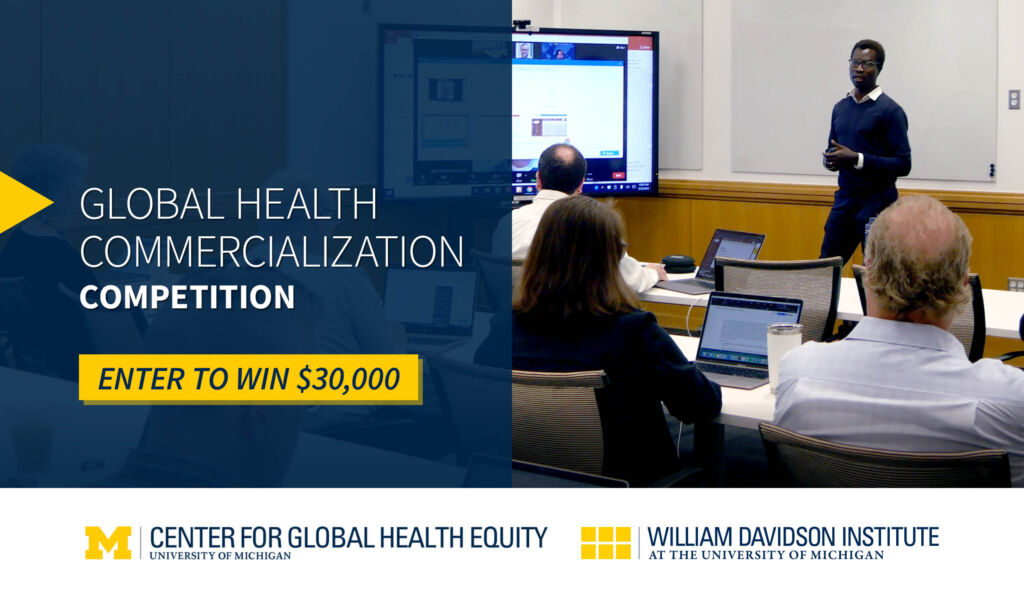
The William Davidson Institute at the University of Michigan is excited to announce the call for applications for the 2024 Global Health Commercialization Competition. This innovative competition serves as a dynamic platform for U-M faculty visionaries based on the Ann Arbor, Flint, and Dearborn campuses, who wish to contribute their scientific and technological solutions to the most pressing global health challenges of our time.
Co-hosted by the U-M Center for Global Health Equity (CGHE) and the William Davidson Institute (WDI), the competition showcases U-M’s commitment to global health equity, with a unique market-driven approach. The competition relies on interdisciplinary collaboration to create sustainable and impactful innovations, aiming to improve healthcare in low- and middle-income countries around the world.
Competition participants will present their business case within a 15-minute timeframe to a panel of industry experts, followed by an informative 10-minute Q&A session. The winning team will be awarded substantial funding of $30,000, provided jointly by the CGHE and the WDI. Additionally, the winning team will be eligible for further consultative services provided by MBA students from our Ross School of Business, as a part of the Multidisciplinary Action Projects (MAP) Program.
The competition also provides extensive proposal review, guidance, and mentorship to all its participants, increasing their likelihood of success. Each shortlisted team is also entitled to a one-on-one consultation session with a member of the Fast Forward Medical Innovation (FFMI) team, who will review the project and provide constructive recommendations to enhance its prospects.
Proposals are due by April 5, 2024, providing an opportunity for team participants to fine-tune their pitches and maximize their chances of success. Application forms, template presentations, and more information about the event is available on our website.
Read more about last year’s competition
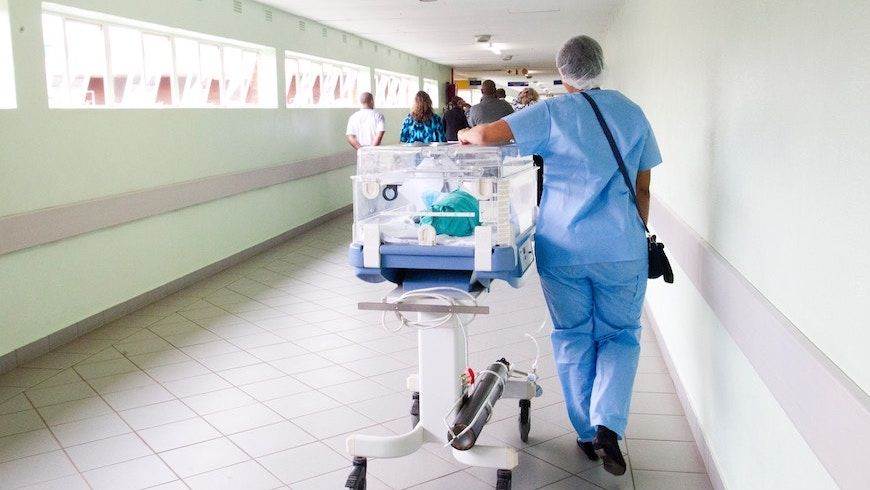
Note: The following post was originally published on NextBillion.net, which is managed by WDI.
By Paul Clyde

Paul Clyde, President of WDI
This past summer, Ghana was selected as the host country for the Secretariat of the African Continental Free Trade Area (AfCFTA), a group of countries with a population of 1.3 billion and a combined income that rivals that of France. These 54 countries will allow free trade between them beginning in July 2020. No company can afford to ignore this market or, more generally, any low- and middle-income country (LMIC). This is especially true for health care companies.
LMIC markets, as categorized by the World Bank, are already large – and they are growing at a much faster pace than high-income countries (HICs). According to the World Bank, total health care expenditures in LMICs were 11% of total health care expenditures in HICs in 2000. By 2015 that percentage had jumped to 25%.[1] And this understates the change. Twenty countries moved from LMIC to HIC between 2000 and 2015 and were therefore counted in the total health care expenditures for LMICs in 2000, but not in 2015. No countries moved from high income to low or middle income over the same period. If we keep the countries that were in the LMIC category in 2000 in the calculation for 2015, the total health care expenditures for LMICs were 29% of 2015 total health care expenditures in high-income countries. Put differently, while HIC health care expenditures were growing at a fast pace at the beginning of the century, LMIC health care expenditures were growing almost three times as fast, according to World Bank data.
The LMIC data described above lump middle-income countries with low-income countries, so it is tempting to think the growth is coming completely from the middle-income countries. This would be a mistake. Since 2000, 33 countries moved from a low-income country classification to middle income. LMIC income levels and health care expenditures are growing at an increasing rate. It is no longer safe for businesses to assume that operations in low-income countries will not be profitable 10 or even five years from now.
Despite the current size and growth rates of these economies, it is not clear if today’s leading companies will be able to serve them. Take the example of Denver-based DaVita, one of the largest providers of dialysis treatments in the world. In 2018, it pulled out of India – despite the fact that India is already the second largest diabetes market in the world, and is expected to become the largest soon. (Diabetes is a leading cause of chronic kidney disease.) DaVita sold its operations in India to NephroPlus, the largest chain of dialysis centers in India. Headquartered in Hyderabad, NephroPlus is raising capital to enter the Middle East and Southeast Asia, capitalizing on the growth opportunities in emerging markets.
It isn’t really a question of whether or not businesses will end up serving today’s low- and middle-income countries as a major part of their portfolio. The question is only which businesses will do it.
—Paul Clyde, President of WDI
This last point raises the stakes. Many companies, regardless of where they are based, will try to take advantage of the opportunities in LMICs, and while it will be challenging, some will succeed. Those that do can eventually be expected to turn their attention to HICs. Entering HICs may require changing their processes or products, and not all will succeed in this step either. But even if only a handful succeed, the competition will be meaningful. Neglect of LMICs today isn’t just a lost opportunity in those markets. It could also spawn competitors in HICs – competitors who, by the time they reach those markets, have a well-honed service or product that is particularly dangerous to incumbent firms.
The task facing today’s leading companies can be met, and doesn’t require drastic innovations – relatively modest modifications to business processes will often be sufficient. Consider, for example, Brook Fekadu, who became a licensed dealer of GE equipment in Ethiopia about five years ago. A major challenge with imaging equipment is its installation, maintenance and servicing. Fekadu trained his staff to provide those services up to GE’s standards. He also purchased equipment himself, and provides diagnostic services to individual patients. Hospitals that don’t have the volume to support some of the expensive diagnostic equipment refer their patients to Fekadu for a diagnosis. Once the hospital develops the volume, he is happy to sell them the equipment and service it. It is an extremely effective business model that can be expected to be repeated in other countries. GE or any other company can use it to expand their geographic reach into LMICs profitably.
It isn’t really a question of whether or not businesses will end up serving today’s low- and middle-income countries as a major part of their portfolio. The question is only which businesses will do it. It will require an investment – including short-term losses – before a return is realized, just as it did with the automobile companies serving China and India in the 1990s. Most of today’s global health care companies, some of which come from LMICs, are already making those investments. Not all will succeed. However, any company that is not making some investment in these markets is effectively ceding them to competitors or, perhaps more likely, entrants into the market, many of which will come from LMICs. And whoever does succeed in developing a business model that is profitable in LMICs has a huge, and growing, market to serve. They may also be able to take a significant share of the market in HICs from incumbents who have not been subjected to the same trials.
Finally, it is worth commenting on the social consequences of this discussion. Any company that succeeds in serving these markets will have done so by satisfying the local customers and hiring people to provide the good or service. The more successful the company is, the more customers will be satisfied and the more individuals will be employed. And that is just the beginning. Success provides the capital and incentive to grow further – something lacking in the absence of profits. We can’t know whether the company that will tap into these markets will be an existing multinational or an as-yet-unformed entrant. But we can be confident that the individuals in these economies will benefit as consumers, employees and/or owners of the companies that prevail.
[1] World Bank’s Health Nutrition and Population Statistics as accessed on August 20, 2019. Based on comparison of current health expenditures in current US dollars. Current US dollars were used instead of PPP because the discussion pertains to the market size for outside investors.
Paul Clyde is the president of WDI and the Tom Lantos Professor of Business Administration at the Ross School of Business at the University of Michigan.
Photo courtesy of Hush Naidoo.
The global reproductive health community is increasingly seeking to engage the private sector in meeting the needs for reproductive health in low-resource regions of the world. Countries such as Malawi in Eastern Africa have a high level of donor dependence and market conditions which inhibit commercial sector development, particularly for serving the more rural and remote areas.
In this project, WDI’s Healthcare team conducted a contraceptives distributor landscape analysis and delivered actionable and stakeholder receptivity-tested concepts for stimulating the private sector provision of family planning products and services in rural, remote and other underserved populations. The landscaping assessment involved field research and in-country discussions with market actors, but also utilized a stakeholder-centric methodology to generate ideas for market building. The results and recommendations are being shared with Malawi country stakeholders, as well as with funders and implementers for potential market building efforts, in Malawi and similar countries.
Vaccines play a critical role in improving global health. While the return on investment of vaccines is on average higher than any other health intervention, there is a still a critical need to evaluate the expected return of each individual vaccine presentation. The key driver of the expected return on investment of a vaccine is the price of the vaccine relative to the value that it is expected to generate through increases in coverage/equity. While simple on its face, estimating price and value is often complex since both are multifactorial.
The objective of this work was to provide the Bill & Melinda Gates Foundation (Gates Foundation) and partners (buyers) with a structured way of evaluating and negotiating potential investments related to the manufacturing of specific vaccine presentations. WDI team members hypothesized they could facilitate negotiations between buyers and manufacturers of vaccines by developing a flexible tool that incorporates their respective investment decision drivers and key levers related to price and value. To accomplish the objective, WDI had three aims (1) Understand the investment decision drivers for the Gates Foundation & partners, and potential manufacturers; (2) Identify the key levers that would form the basis of a contract that the Gates Foundation and partners could use in negotiations with potential manufacturers; and (3) Build a tool that the Gates Foundation and partners can use to evaluate scenarios with potential manufacturers. The output of this work is currently being applied to Gates Foundation-related investment questions.
WDI’s Healthcare team conducted a project for the Linked Foundation to inform social enterprise investment in Latin America. The Foundation seeks to identify market-based, impact investment opportunities specific to women’s health in Latin America, based on an integrated assessment of the major unmet needs in combination with identification of high-impact solutions and opportunities to foster the enterprise ecosystem and sustainable women’s health solutions. WDI developed an analytic methodology, conducted a landscaping for Colombia and Peru, and finalized a report including recommendations for development of the health investment ecosystem. The report has been widely disseminated in theLatin America impact investment community. Linked anticipates this work will inform their investment strategy as well as catalyzing additional resources to the most-needed areas in women’s health in Latin America.
This project is focused on supporting donors and country governments in understanding how much money is spent on each type of HIV-related intervention. While this seems like it should be straightforward, it is not because the both donors and countries use different budget formats, making it very difficult to compare line items between budgets. The long-term objectives of this work are to (a) understand the current costs of HIV-related programs and (b) use this information to advocate for change (increased funding or increased efficiency, depending on the results).
WDI concluded a six-year longitudinal study on the impact of USAID’s Health Enterprise Fund program. Funded through Abt Associates, this program was meant to increase access to quality family planning products via the private sector. WDI’s focus this year was describing the lessons learned, and providing recommendations to USAID Missions and impact investors on how to support the development of private sector health enterprises.
Sally Stephens, the Feb. 12 WDI Global Impact Speaker and chief business officer of Medicines360, the only nonprofit pharmaceutical company with a marketed product in the U.S., sat down for a one-on-one interview while on campus. (Watch the interview below.)
Stephens was interviewed by Andrea Bare, senior advisor with WDI’s Healthcare focus area, who talked with Stephens about a number of the organization’s operations. Stephens detailed Medicines360’s origin, its business model and how it operates, its approach to partnerships, how the U.S. market compares to sub-Saharan Africa and what the future holds.
Regarding partnerships, Stephens told Bare that Medicines360’s approach is to “partner if someone has the expertise that will help us meet our mission,” she said. “We saw a lack of expertise in the U.S. public sector, so we developed that expertise.”
She said the same “myths and gaps” exist in both the U.S. and sub-Saharan Africa markets. For the future, Stephens said, Medicines360 will “focus on broadening our impact.”
“It is all about access for us,” she said.
Medicines360 has a unique mission-driven business model and an innovative partnership with Allergan. As its name implies, Medicines360 has a global focus and is driven to meet an unmet need for women around the world, including in the U.S. That is, affordable, long-acting contraceptives.
Its first product is a hormonal intrauterine device, or IUD, which had been out of reach for many women because of the high cost of the sole brand on the market. Medicines360 offers its FDA-approved Liletta at a discounted price to public sector clinics across the U.S. to increase access to this important family-planning product.
Additionally, Medicines360 has been working with international health organizations to offer the product, branded as Avibela in low- and middle-income countries, to also increase access to these markets. Avibela was launched in Madagascar in 2018. Sales of Liletta in the U.S. help fund research and development efforts by the company to bring contraceptives to countries such as Madagascar.
Stephens, who joined Medicines360 in 2011, leads the corporate strategy, business development, marketing and sales, and the developing countries programs at the organization.
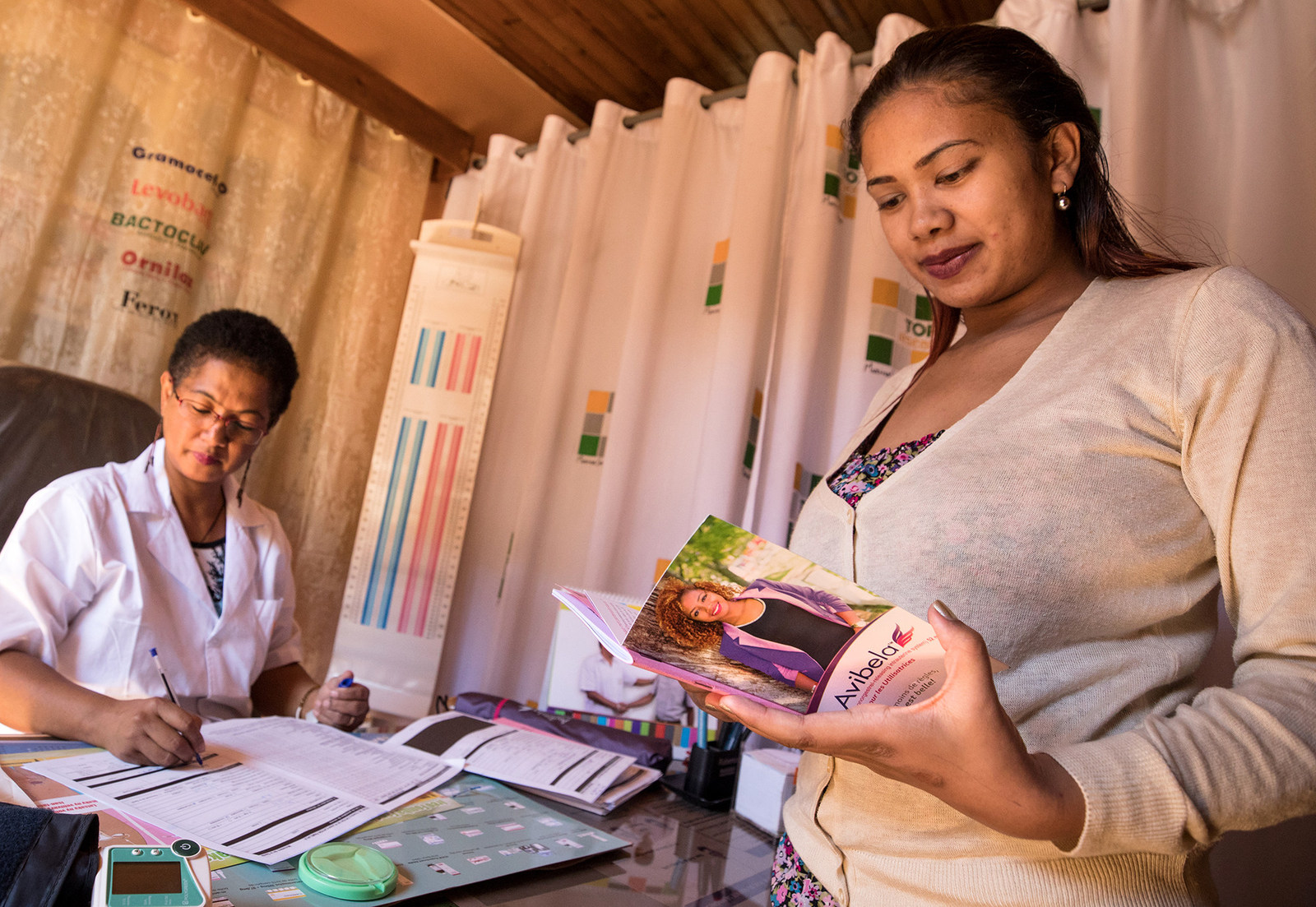
Considering how innovative business models can improve access to quality medicines for women regardless of where they live, their insurance status, or whether they can pay will be the topic of the next WDI Global Impact Speaker Series.
Sally Stephens, chief business officer of Medicines360, the only nonprofit pharmaceutical company with a marketed product in the U.S., will speak at 5 p.m. on Tuesday, Feb. 12 in room R0230 at the Ross School of Business. The talk, “Closing Critical Gaps in Women’s Healthcare Around the World: The Story of Medicines360, A Nonprofit Pharma Company,” is free and open to the public.
 Medicines360 has a unique mission-driven business model and an innovative partnership with Allergan. As its name implies, Medicines360 has a global focus and is driven to meet an unmet need for women around the world, including in the U.S. That is, affordable, long-acting contraceptives.
Medicines360 has a unique mission-driven business model and an innovative partnership with Allergan. As its name implies, Medicines360 has a global focus and is driven to meet an unmet need for women around the world, including in the U.S. That is, affordable, long-acting contraceptives.
Its first product is a hormonal intrauterine device, or IUD, which had been out of reach for many women because of the high cost of the sole brand on the market. Medicines360 offers its FDA-approved Liletta at a discounted price to public sector clinics across the U.S. to increase access to this important family-planning product.
Additionally, Medicines360 has been working with international health organizations to offer the product, branded as Avibela in low- and middle-income countries, to also increase access to these markets. Avibela was launched in Madagascar in 2018. Sales of Liletta in the U.S. help fund research and development efforts by the company to bring contraceptives to countries such as Madagascar.
Stephens will discuss the history of Medicines360, its successes and its plans to expand access to its affordable medicines and products for women.
“I think that students will be intrigued by how Medicines360 is reinventing the pharmaceutical business model through a non-profit company with a strategic focus in women’s health and underserved patient communities here in the U.S. as well as globally,” said Andrea Bare, senior advisor with WDI’s Healthcare focus area. “Sally has a unique blend of corporate as well as non-profit organizational experience, and she is bringing this to bear in her role as chief business officer. This talk will be interesting for insights on alternative business models, serving underserved populations, and an interesting career trajectory.”
Stephens, who joined Medicines360 in 2011, leads the corporate strategy, business development, marketing and sales, and the developing countries programs at the organization. She has extensive experience working with nonprofit and for-profit organizations, including the New York Blood Center, Kaiser Permanente and nine years as vice president of business development and strategy at Novartis Diagnostics (formerly Chiron Corporation).
She received her bachelor’s degree in chemical engineering from UC Berkeley and her MBA in healthcare management and finance from the Wharton School at the University of Pennsylvania.
(Photo courtesy of Evelyn Hockstein/Medicines360)
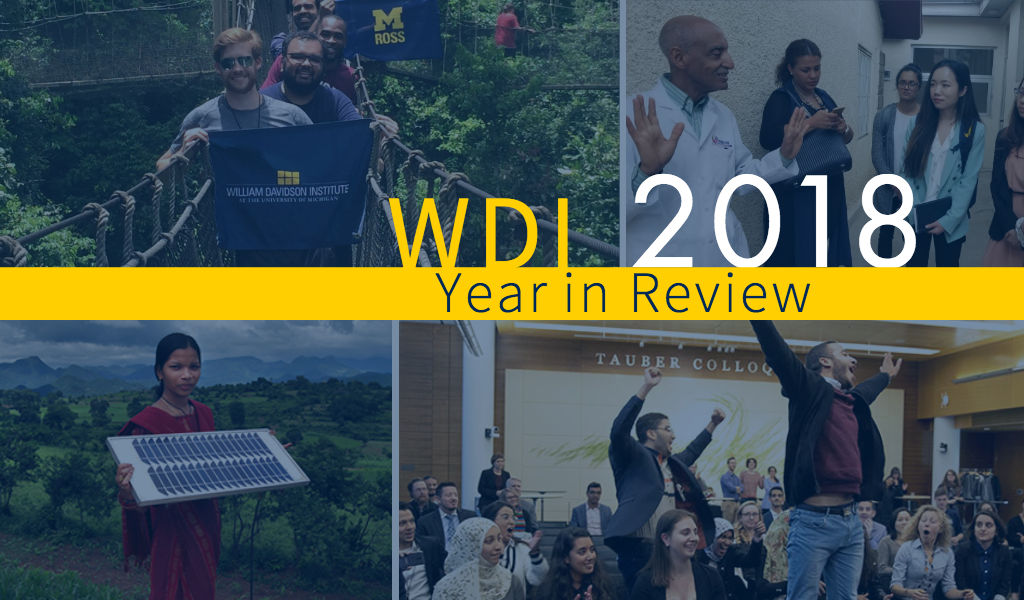
Improving reproductive health supply chains to boost access to family planning products in Mozambique. Educating senior managers from around the Baltics. Helping both investors and enterprises they support better measure impact in Latin America. Creating new MBA-level curriculum for universities in Papua New Guinea.
These partner projects are just a few examples of the work WDI performed around the world in 2018. Working with a robust set of private sector and nonprofit partners on a diverse number of projects, WDI effectively applied business skills in low- and middle-income countries (LMICs) in impactful ways.
In all, WDI teams worked on more than 40 projects with more than 40 partners in more than 40 countries this past year that focused on our core consulting sectors—education, energy, finance and healthcare, as well as our management education programs, entrepreneurship development, measurement and evaluation services and the deployment of University of Michigan graduate students around the world.
“In 2018, I was impressed by the degree to which the Institute integrated the energy and talents of our staff, University of Michigan students and faculty leaders to address multiple challenges facing for-profit and non-profit organizations,” said WDI President Paul Clyde. “While most of these projects were in one of our key focus areas—Energy, Healthcare, Management education or Finance—many drew on expertise that cut across sectors or disciplines to deliver more complete solutions.”
WDI’s project work leveraged the knowledge and expertise of the Institute’s staff, its research fellows and faculty from the University of Michigan and other world-class higher education institutions to develop business solutions in LMICs. Additionally, WDI disseminated what it learned doing work in the field through published research reports, academic journal articles and notable blog posts. The Institute also contributed to U-M student and faculty enrichment by hosting several compelling speakers at the Ann Arbor campus.

Members of the LIFE project consortium visit a produce stand in Turkey and interviews the owner on how a green grocer sources his produce and his perspective on how he could potentially benefit from the LIFE Food Enterprise Center.
Our work in 2018 spanned the globe and included projects on a wide variety of topics and issues. Among the work, WDI launched a new consulting focus area in the energy sector, connected hundreds of students using virtual technology, developed a model to train nurses for a planned hospital in Ethiopia and trained refugees in the food industry in Turkey. Here are a few highlights from our project work this past year.
Throughout the past year, WDI has widely shared its research and field work a to a broader audience through a number of publications and online journals.
“Participating in the project to test the framework provided us a holistic understanding of poverty. WDI gave us the tools to guide decision-making and track progress towards broader development goals through data collection and analysis.”
—Mónica Varela, director of impact for the Clinton Giustra Enterprise Partnership
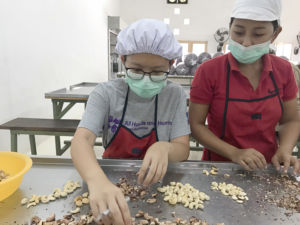
WDI intern Nadia Putri (pictured left)
A number of WDI employees penned blogs on their work or trends impacting their research that appeared on the Institute’s website.
In 2018, WDI hosted speakers as part of the the Institute’s Global Impact Speaker Series. While on campus, many of the speakers sat down for one-on-one interviews.